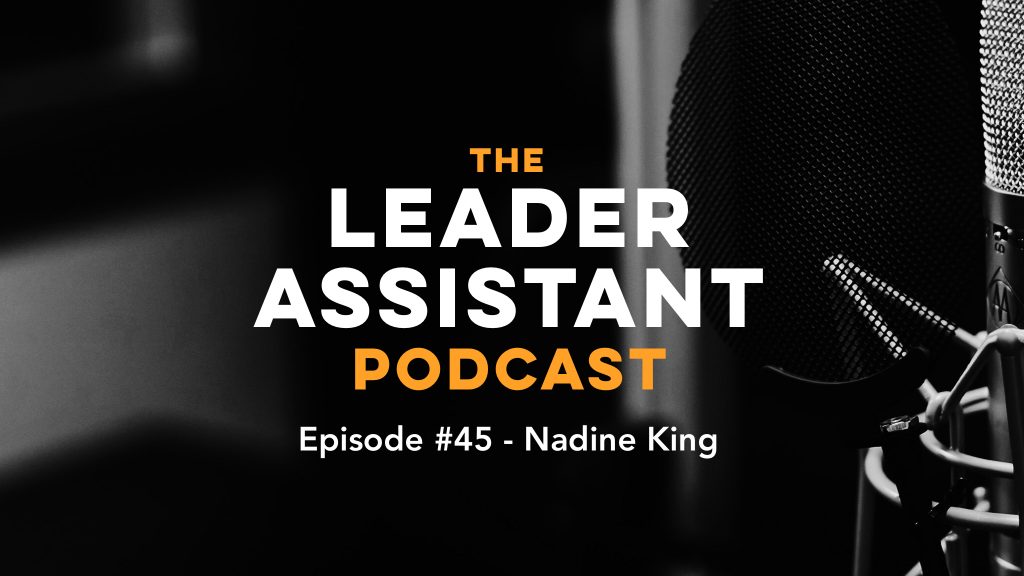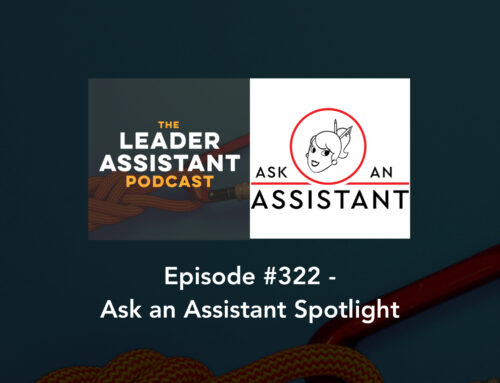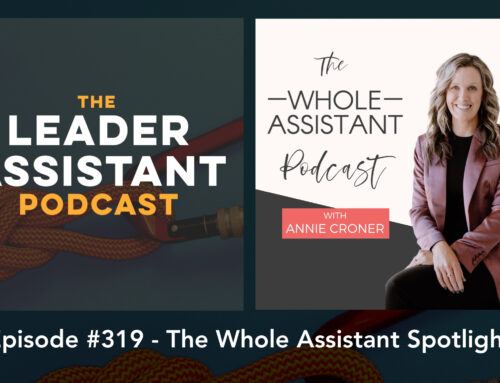UPDATE: Unfortunately, April ‘Nadine’ King passed away on Monday, May 18, 2021. She lost her battle with Covid-19 at the age of 41. My condolences to her family and friends. I know the entire EA community will miss her dearly.
Nadine King is Author of The Ninja: Chronicles of an Assistant, Pastor and a Coach. She is also a 20+ year veteran with experience supporting C-suite executives, vice presidents, executive directors, local church leaders, small business owners and entrepreneurs as an executive assistant and virtual assistant.
Nadine and I talk about working with Type A executives, managing an inbox, the role of a virtual assistant, and the book writing process.
Enjoy our conversation and be sure to reach out to Nadine to say hi!
LEADERSHIP QUOTE
Ideas don’t come out fully formed. They only become clear as you work on them. You just have to get started.
– Mark Zuckerberg
CONNECT WITH NADINE
ABOUT NADINE
NOTE: Unfortunately, April ‘Nadine’ King passed away on Monday, May 18, 2021. She lost her battle with Covid-19 at the age of 41. My condolences to her family and friends. I know the entire EA community will miss her dearly.
April Nadine King is a 20+ year veteran with experience supporting C-suite executives, vice presidents, executive directors, local church leaders, small business owners and entrepreneurs as an executive assistant and virtual assistant. With a background in both for-profit and non-profit sectors, Nadine brings with her a wealth of experience and knowledge in communications, financial management and executive administration.
A recent author of the book The Ninja: Chronicles of an Assistant, Nadine is an advocate for the profession supporting the growth of others in various administrative support roles.
Nadine is currently the President of Staff Council at Spelman College, having served on and staffed several organizational committees, Nadine values the importance of service.
Experienced in coordinating office systems and special projects, Nadine has managed large budgets (over $2 million). Nadine is an expert in Microsoft Office Suite, PeopleSoft, BOA/Citibank Credit Card reconciliation systems, Accountant’s World, Sage Software, G5, OrgSync, Kronos, Banner, SmartSheet, Lucid Charts, Google Chrome and cloud based programs.
SUBSCRIBE
Subscribe to The Leader Assistant Podcast so you don’t miss new episodes!
You can find the show on Apple Podcasts, Spotify, Google Podcasts, Pandora, and Stitcher.
Join my email list here if you want to get an email when a new episode goes live.
JOIN THE COMMUNITY
Join the Leader Assistant Slack Community here, or the Facebook Group here for bonus content and to network with other assistants who are committed to becoming leaders!
LEAVE A REVIEW
If you’re enjoying the podcast, please take 2 minutes to rate and review the show on Apple Podcasts here. Each review helps me stay motivated to keep the show going!
—
EPISODE TRANSCRIPT
Nadine King 0:00
Hi, I’m Nadine King. And today’s leadership quote comes from Mark Zuckerberg, which is one of my favorite quotes. ideas don’t come out fully formed. They only become clearer as you work on them. You just have to get started.
Podcast Intro 0:20
The Leader Assistant Podcast exists to encourage and challenge assistants to become confident game changing leader assistants.
Jeremy Burrows 0:30
It’s episode 45. And here’s your host, my dad. Welcome Friends. This episode is going to be a fun one. I’m talking with Nadine King, longtime executive assistant. So yeah, it should be a really good chat. I hope you enjoy it. Be sure to check out the show notes at leaderassistant.com/45. And again, Join our online communities at slack.leaderassistant.com And Facebook.leaderassistant.com One more thing be sure to check out our online courses at assistantsguide.com We’ve got a few courses on there. Now we’ve got more courses coming soon. At various price points in a variety of topics. So assistantsguide.com. Hey, everyone. Thanks so much for tuning into The Leader Assistant Podcast. It’s your host Jeremy Burrows. And today I’m super excited to talk with Nadine King Nadine, how are you?
Nadine King 1:32
I’m doing great. Thank you so much for asking.
Jeremy Burrows 1:36
So what was your very first job? And what skills did you learn that you still use today?
Nadine King 1:41
Um, well, I’d say my very first serious job was working in banking, I was a teller branch supervisor. But I also was considered like the right hand person to the operations manager there. So kind of assistant her and, and some of the variations of the office and overseeing the tellers. And the skill set I used there, we did a lot of cross training. So just kind of learning other departments being open to collaborate. And that’s something that I’ve kind of carried through my career.
Jeremy Burrows 2:16
Nice. So it’s kind of a sounds like a very assistant type job that you started off with. Yes, I
Nadine King 2:25
did. I did.
Jeremy Burrows 2:28
So when and why did you become an executive assistant?
Nadine King 2:34
Um, well, I kind of, you know, moved on to doing some administrative work in different churches and things like that. And there was a time in my life where I had an opportunity to become the EAA after doing those types of jobs to a lady who was the CEO of seven different companies or organizations. And she was very dynamic, very fierce go getter. And so the opportunity came during a very hard time in my life, actually, I was going through an abusive marriage. And, and it’s crazy and how God works and the universe works. But, you know, it came about during that time, and she, you know, had the resources to help me out and I became an assistant and, and everything kind of took a turn there. And I learned so much. And that’s when I found out that I had a passion for it and could do it very well.
Jeremy Burrows 3:30
That’s awesome. So what have you, what have you loved about the role?
Nadine King 3:36
The variety, the, the, the day to day, opportunities to face, like so many different types of challenges. From one day, I could be, you know, running errands to the next day sitting in a board meeting, planning a luncheon or entertaining some execs to the next day being the nanny if the nanny wasn’t available. So the variety of being able to not grow stale, and what I was doing, and that’s always been exciting to me.
Jeremy Burrows 4:13
Yeah, me too. There’s never a dull moment, right?
Nadine King 4:17
Yeah, never a dull moment. Never a dull moment. It’s always just, it’s great. And especially when you you are an EA to a very dynamic person who’s a visionary and they have goals and you know, and they see your worth and your value and they bring you along. They bring you on board to kind of help reach those goals. So that’s always been exciting.
Jeremy Burrows 4:38
It’s great. So what has been the maybe one of the most difficult parts about being an EA
Nadine King 4:48
um, I think sometimes dealing with the people that are not in your seat. So if you are an EA and you kind of play The first stop before the person gets to the CEO, like your other co co workers or colleagues and you know, and you have to kind of help navigate kind of play the doorkeeper per se. It’s kind of difficult when some people don’t understand the role that you, you know, the role that you play, or the the value that you bring to the organization. And I think that’s hard. It’s kind of hard navigating your colleagues, their perceptions, what they think of you what they don’t think of you. And, yeah, I think that’s been some of the most one of the most difficult things.
Jeremy Burrows 5:36
Yeah, definitely. Yeah, it’s, it’s a very, can be a very lonely role. It can be very isolated role. And yeah, it’s hard for people to understand the role unless you’ve been in it.
Nadine King 5:47
Yeah, yeah, exactly.
Jeremy Burrows 5:50
So do you have any crazy stories? Or, you know, instances that you maybe saved the day or? Were asked to do crazy things during your career?
Nadine King 6:04
Yeah, so many that I’m like, I’m trying to find the craziest events. Oh, man, when you say crazy, like crazy, like just,
Jeremy Burrows 6:17
you know, like, family friendly, crazy.
Nadine King 6:22
Oh, yeah. Yeah. I mean, of course, that but
Jeremy Burrows 6:27
I funny or ridiculous. You know, I
Nadine King 6:30
had a moment where I, you know, you can become so close sometimes your executives, especially if you’re a female assisting a female or male assisting a male. And there was a time where I had to help the lady who cleaned the house, you know, kind of navigate some things. And I saw my boss’s underclothes, and I, and it was a moment of just like, Oh, my God. Is that really, you know, and, you know, the maid kind of tried to pick them up really quick. And I was like, oh, you know, and it was just, it was just kind of like one of those moments where you chuckle you know, you’re like, how did I really just see her? Or bloomers? You know, that I thought that was funny. May not be funny, somebody else. But that was funny.
Jeremy Burrows 7:20
Yeah, you kind of you kind of get to see. The Good, the Bad, the Ugly, the dirty. See a little bit. Yeah, they don’t? Yeah, yeah, you do you do? So what was maybe the biggest mistake you made as an assistant? And what did you learn from it?
Nadine King 7:37
Um, recently, I my job, we, this is most recent, actually, just like a week ago, we had an event, it’s the opening event for the campus, and everybody attends from the President, to the staff, all of the students, the new students, and there was a blip in the program will not a blip with the provost, this script, she was asking me, should she go up on stage, and I actually told her no, not to go up on stage, and she should have been up on stage. And the choir that was supposed to sang the glee club. They were, they were stalled. And it was just like, the longest, it was a probably like a one to two minute delay, but it felt like eternity. And I just, it was bad. It was all my fault. And one thing that I did is I reached out to everybody that was affected by this mishap because you could you could hear it in the auditorium. It’s like 700 people there. You know, everybody’s like, what’s going on, you know? And then, you know, my boss is looking at me, and her boss is looking at me, and everybody’s like, you know, what do we do next? And, and it was a moment of just like, I wanted to go into my shell, even with my years of experience, you still have those moments where you’re like, Man, I screwed up. But I, you know, I made sure that I kept in mind that I’m still human. And I, I think one thing I learned from it, even though I used all the tools that, you know, are at my fingertips to own my mistakes and tell the truth when you did something wrong. And you know, you did something wrong, you know, and you apologize, and I reached out to those individuals that were on the program and I gave a formal apology from, you know, from deep within, but I think this time that actually what I learned from it, was that although I made that mistake, I’m okay. It’s okay because I’m human. And I think sometimes we become so engulfed in doing things perfectly. That we forget that we are here Women, and we don’t have to be as hard on ourselves as we normally are. Because I’m kind of a perfectionist in some ways and in my work in what I do at work, that I’m like, it’s gotta be right. It’s got to be right. And if you put so much pressure on yourself, you know, I’ve put so much pressure on myself when I’ve made mistakes. And so, sometimes the lessons are you learn from the mistake to say, oh, I want to do that again. But this time, in making the mistake that I did, I said, I’m not going to beat myself up, like I normally would, and walk away where I’ve got a headache, I’m stressed out the rest of the afternoon, which I kind of was, but I had to keep talking to myself and pulling myself away from that ledge, and realizing it’s okay. And then my boss later that day, she came to me, which was a very, very, you know, it was a shock. And she said to me, she said, April, you know, and my first name is April, my middle name is Nadine. So just so you’ll know. But she said, April, you know, she said, It’s okay. You know, because everyone else came to me after the fact that said that it was a really good program. And they didn’t see it the way that you saw it. And so, you know, sometimes our mistakes become like these, they’re, they’re really small, but then they become these big monkeys and gorillas on our backs. And we carry it. And I just learned in that moment to let it go.
Jeremy Burrows 11:23
Yeah. Yeah, that’s great. I, I talk a lot about confidence and how I think one of the best ways that we can have confidence is by remembering that no matter how well or how poorly we perform at work that day, we’re still a valuable human being.
Nadine King 11:48
Yes, exactly. Exactly.
Jeremy Burrows 11:51
So okay, so you’ve been an executive assistant, but you’ve also been a virtual assistant. So talk a little bit about the maybe the biggest difference, the other than, you know, physically being present in an office and not maybe some of the biggest differences between the two. And then which one did you like better?
Nadine King 12:11
Oh, wow, I like there’s a lot that I like about both of them. And then you said other than the, because there’s freedom, of course, without being attached to the brick and mortar? What did I like most? You know, I think there’s a lot of autonomy that you have, well, even in our roles as EAS, there is a bit of a lot of autonomy that you have. But with being a VA, the, the amount of being creative with my projects, or being more creative with how I construct my day. And how I construct my time was was I loved it. Because I know when I’m more inclined to have, you know, my all of my, what I call attention sales focused, I know when my mind is more alert. So being able to work around that and maximize my potential when I knew that I was hitting on all cylinders. That’s what was exciting about the freedom that I had with being a VA. And what do I like? It that’s kind of difficult to answer because, you know, in the role that I play now, I really, really love my job. I really love my executive, and I love what I do, and I’m very passionate about and I love the mission of the institution that I work at. So to say, What do I like better? That would be kind of difficult. But the difference between the two would be that the freedom of you know, being able to do work when I wanted to do it. And when I but, but not even just when I wanted to do it, but when I knew that right now, like, at this very moment, you know, I’ve got the power. I’m about to produce something great. And then I could just hold all my energy at that very time.
Jeremy Burrows 14:20
Yeah, I like the working from home part of you know, you don’t, you can much more easily avoid the distractions of people come by your desk and yeah, because you’re just not there.
Nadine King 14:36
You know, that’s crazy, because I always talk about how my door just seems like it’s constantly swinging. Somebody’s always knocking and I don’t get work done until everyone’s gone.
Jeremy Burrows 14:47
You have a door. Yeah, I
Nadine King 14:49
do. I don’t have a window though. But I do have a talk.
Jeremy Burrows 14:54
That’s awesome. I’m jealous. I’m an Open Office. So you know, I still have one cubicle wall. By I guess I have to now. But I’ve, I’ve liked the only one that’s has it because I’ve been holding on for dear life to don’t want to tear down the wall. Don’t tear down the wall. So what’s your number one tip for managing an executives email?
Nadine King 15:21
Huh? My number one tip? Well, it’s kind of two ish, I guess, but flagging and color coding for managing. i Well, my number one tip for managing anything in the office is I never ever use one way of organizing something. And what I mean by that is that I always have a backup of how I organize things. So, for example, I think people should be free should be flexible, every day should be flexible, and how they organize sometimes we can get so strict that we’re like, I only do it this way. But let’s say that you color code, you use sticky notes, you flag and you write in a notebook? Well, for me, even with managing emails, calendars, whatever, I made sure that I write something down in two different places on my four different methods that I have. And the reason being is because there’s days where it’s really chaotic. And if I only wrote down everything I needed to do in my leather book or something, I may not pick up that leather book that day. So I may be looking at sticky notes. Or I may consider taking time to look at all of the follow up flags that I have are all of the things that I’ve color coded red in my email. So I’m very big on doubling, like the process. So if my, if I see an email, and the email says schedule this meeting, such and such time, I don’t have time to look at it, I’m gonna flag the email, and then I’ll grab a sticky note. And I’m gonna write down schedule such and such meeting and I’ll stick the sticky note that day. And then the next day, I may, you know, flag the email, and then I’ll put it in my leather bound book. So then at any given moment, nothing falls through the cracks. If that makes any sense.
Jeremy Burrows 17:24
Yeah, just being flexible and using whatever means necessary and not being so, you know, bent out of shape when you can’t do the system you want to do,
Nadine King 17:35
right, but just but the two is the key, the to doing it, double is the key. So so whatever you use as your method, which I’m sure most people have multiple ways of organizing things, you always write something down or organize it where you have it written down twice, at minimum, because then you don’t forget,
Jeremy Burrows 17:57
I was gonna say, do you see that more as a as a memory thing? Or as a? Could you mentioned a backup? Do you think it’s more of a memory thing? Like just ingraining that into your head? Or is it also equally as important to have the backup
Nadine King 18:13
is equally important is to have the backup? I mean, I think it helps, I think it helps. But I because I’ve noticed, there’s days, like, you know, I remember one time I used to just put everything into my own online, I said, Okay, this is going to be my way to organize everything my to do is in this smart sheet, right? So I’ve got all of this stuff in Smartsheet. And then there’s been days that I don’t even look at the smart sheet. And I’m looking at sticky notes. Or I’m looking, I’m going through all of my follow up emails, or I forget to look at the smart sheet. And then I look a day or two later, but I’ve looked at so my thing is it’s not necessarily I mean, it helps with memory. But I’ve coached some EAS and doing this and it like it really does work. It’s just the whole follow up system where you’re backing yourself up with something, so it doesn’t fall through the cracks.
Jeremy Burrows 19:05
So you’ve done some assistant coaching and training, you know, how did you get into that? That whole world of helping other assistants?
Nadine King 19:15
Um, you know, some of it has just been like, well, I’ve done a lot of it through my church. You know, I do believe that administration is a gift. And it’s something that people who are good at it, you know, the Greek word for administration is carbonaceous, I believe is how you say it. And it’s somebody who can steer the ship, you know, the captain of the ship. So I’ve done a lot of it that way. I’ve also done it at the institution that I’m at just people asking me to be just a job coach for their administrative assistants. You know, just help guide them along the way. You know, I have one on ones with them to make sure they’re good to get them to a level where they’re operating at a certain capacity. And just putting my name out there, you know, done a couple of forums and a couple of panels, just, you know, getting my feet wet. But yeah, but it’s it’s been an honor to have people that, you know, respect the work that I do, where I work at, and love the excellence that I put into it. And so they ask, and I just I serve. Yeah.
Jeremy Burrows 20:29
So what’s maybe one tip that you would give an executive, to help them get more out of their assistants and really utilize their assistance? Well
Nadine King 20:41
know their value. And, you know, sometimes it takes time to build trust, from an executives viewpoint, you know, they may not trust the person, but know that they do add value in some sort of way. And so, if you lean on that saying that, okay, I know, this person can add value, you may not quite know how yet, especially if you’re new, if you’re a new executive, with a new EA, maybe you’ve never had one before. If you come in with the mindset that this person can add value to me as an executive, they can help me reach my goals, and they could help me achieve certain things that I probably couldn’t achieve in normal time. If you come with that perspective, perspective, then you will open up the door and the opportunity for them to show you the value that they add, or how they can change your life or how they can assist with you reaching your goals, but just know off the bat that EAS do have value and they add value to your work.
Jeremy Burrows 21:48
So is there something I love that by the way? Is there something that assistants can do when they feel undervalued? Or aren’t being respected or recognized?
Nadine King 21:59
Besides jumpship?
Jeremy Burrows 22:02
Honestly, that’s sometimes that’s the best option.
Nadine King 22:04
Yeah, you know, it’s crazy, because I had an opportunity to speak to someone that recently was, you know, that asked me personally to coach, not her boss, and she was the opportunity. The ties were severed. But, you know, and that was a question like, how do I get this person to see that I add value, and no matter what tips I gave, it was just something like, okay, you can finally see that the conversation would need to be had with the executive as well, you know, because it’s a two way street, it’s a two way street. It’s a two way dance, you know, and sometimes they just don’t know, you know, they don’t know how this relationship should work. And, you know, I’m talking about executives, you know, they may not be aware. And, you know, they don’t know how equipped we are, you know. So it, you know, you can sit there and you can give all the tips in the world, like you said, jumping ship, maybe the only option, if that person never sees, I think being considerate of what they feel and what they think I’m talking about the EAS perspective, perspective, if you are considerate, and take into consideration how they feel, and why they may feel like that, that may gain you some more patients and how to deal with them. But then be consistent. And then while you’re being consistent, just be aware, aware and knowledgeable that this is how they feel, right? They don’t value me right now. And if you are aware, then you can own it. You can own it. And you can steer the narrative the way that you want to steer the narrative. But if after you’ve done all that, the only option sometimes may be to jump ship. And especially if you’re one that’s a go getter, and you’re not wanting to grow stale, and you know, allow something like that to define you. And you know, there’s other dynamic executives out there that understand the value that you bring to the table that would be willing to take like, yes, yes, I need you. Then that may be the only option. But you know, like I said, Be considerate, be consistent. Be aware of what they’re thinking how they’re feeling. You now own it. And then after you’ve done all that, and if it doesn’t change after you’ve given some time for that consistency, then you might want to look at other options.
Jeremy Burrows 24:40
It’s great. So speaking of dynamic executives, what does type a mean? And how would you encourage assistants who work with a type A executive?
Nadine King 24:55
Well, I know there’s like this textbook thing about Type A’s and anybody can Google it. it but most of the time, when you say type A most people are talking about an executive that’s very goal driven, goal oriented, results oriented. They’re very aggressive. They’re not passive. They’re very direct, I think come off as dry. Honest. And they’re just like in your face. You know, this is what it is, this is what it’s going to be and can’t change. It can’t change my mind. And so that is what I always think of personally when I think of typing is, and what was your the question? And how do you work with them? Yeah,
Jeremy Burrows 25:39
how would you encourage assistance? Yeah, I work with a type A executive.
Nadine King 25:45
Um, well, some of the pointers that I gave with just dealing with someone who doesn’t see your value because sometimes Type A’s can be a little harder to jump on board. Or, or they can be a lot more difficult to kind of see your value. So there’s, there’s there’s that dynamic too. But I still believe in and what I stated before, you know, being consistent with Taipei’s is very important. And being honest with them, is very important. So you have to know where they’re coming from. A lot of times, Taipei’s are straight shooters. And so when you’re dealing with them, if you know where they’re coming from, if you know why their approaches their approach, it’s it’s pretty easy to deal with them. And you can’t have your feelings on your sleeve. You can’t wear your emotions on your sleeve. When you have someone that is a type A they’re aggressive. They’re not a pushover, and they don’t want an EA, that’s a pushover. And so you’ve got to get a backbone. You know, in my book, I talk about that having that steel, titanium, diamond, whatever, whatever type of wonderful stone or metal you believe in, you’ve got to have a backbone that’s just like that strong. And when you’re dealing with a type A, so kind of learning to have those types of skills where you’re not easily offended. Where you’re able to take a lick and keep on ticking. These are some of the things that are important to have when you’re dealing with Taipei’s.
Jeremy Burrows 27:42
It’s great. So speaking of your book, it’s called the ninja Chronicles have an assistant right? Yes, sir. So tell us a little bit about it. And how did you come across? Just you know, writing a book, when did you decide you wanted to write a book?
Nadine King 28:00
You know, I decided when I was asked to like I said before my job but you know, I’ve been asked to do some trainings and you know, people that know me outside of work, and you know, I’ve done I’ve spoken different places, and you’re like, you should write a book. And what’s crazy is Jeremy, I’ll tell you think I had impostor syndrome. Dealing with this if I’m, if I’m saying this correctly. Yeah. I was like, okay, yeah. All right, I’ll write the book. And. But when I started writing it, I became fearful. Because I was like, I don’t think I really have much to say. So I kind of punked out, right? And I said, Well, what I’ll do is I’ll just write a manual. All right, like a little five page manual. This is what I’m telling myself, right? When you know, people realize, oh, you should write and see my husband, he writes it. So he was encouraging me to do the same. It’s like he should read like, I don’t think anybody’s gonna, why would I write a book? I was like, Okay, what I’ll do is I’ll just write like this little manual, a little conference, PAMP pamphlet or something that I can share with people and, and, and it’s unassuming, right? So I was like, Yeah, I’ll just do this. And in my mind, I was thinking, if I do it like this, then if they read it, great, but if they don’t read it, it doesn’t really matter. Because it’s only like five pages, right? It’s only like five or 10 pages, you know, how they do a little pamphlets, you know, where you do like the little ring, you know, and I already had the little comb thing that you bind the book with, you know, and I’m like, just put the little plastic combs on it, you know, just put something on it. It’s like okay, yeah. So So I started to write it and I was like, Okay, I’m gonna make three to six major points. You know, in order to be a great EA, you have to have great time management skills. You have to know how to manage temperaments. You have to be detail oriented. So I started writing it out and it just kind of like what As typing out, like some of the key points that fall that fell under those particular overarching themes, right? And so I’m typing out and I got to like, no, no joke, I got to like three pages 11 point font. It was like not double spaced or anything. So I’m like, yes. Because once I format this and double space that I probably like five pages, so maybe I’ll go to like seven or eight. This is how I’m talking to myself, right? So I decided to, I was driving home and like, my spirit was like, Okay, you’re just you’re doing yourself no justice. Like, you have such a great story to tell. You can tell it in the way that you tell it, and you’re doing yourself no justice. And I kind of shake it off. So then one day, I was at my office during my lunch break, and nobody was in the office, and I decided to read it out loud. And so I printed it off. And I started to read and I was like, you know, and I’m paraphrasing here, I was like, okay, in order to be a great executive assistant, you have to know how to manage temperaments. Managing temperaments is blip, blip, blip, flat, right. And so, I’m reading it out loud. And as I’m reading it out loud, I literally felt like crap. Because it was like, This sounds nothing. Like you a, you know, this, this is not you. This is not you at all. And so I, I just, I plopped down in my seat, I remember popping down in my seat and thinking, This is not you. This is this sounds boring. This is dull, who wants to read, you know, throw it away. So I balled it up, I deleted everything I wrote. And I started off and I, you know, I wanted to use my middle name is my pen name, which is my middle name is Nadine. So I started off at the top of the page, Nadine Kane. And I just allowed myself to go into a place where my creativity could flow, right, because remember, I talked about love being creative love being. And I just started typing. You know, and I talked about this, at the very beginning of the book that, you know, I had approached this process of writing this book, I thought I was going to do this research. And, you know, and I had all these different ideas, and this manual and, and blah, blah, blah, and it just didn’t pan out that way. And that it panned out in a way that I needed to just tell my story, because my story was important. My story has value, it could definitely enlighten those that are EAS, those that are not EAS that are, are entrepreneurial minded, or whatever, it can enlighten them. And I could tell my story, in my own words, and I got freedom from that. And I just start typing, I just start typing, typing, typing, typing. And then, you know, I did voice to text, you know, driving home. And so a lot of that was the whole process, because of how the book came together. And but it didn’t start off that way. It started off with me just not really believing in myself and not believing that my story could definitely add value to the new way of of us bringing attention to leaders as our assistants as leaders. So
Jeremy Burrows 33:18
that’s great. Yeah, love it. I’m working on my, my first book. So it’s fun to hear other people’s struggles and stories of how they kind of found their voice and in the writing process. Do you have any tips? For I know there are a lot of other assistants I’ve talked to they’re like, oh, I want to write a book on this or I want to blog on this. Do you have any tips, just general writing tips, or maybe you’re just tips on how to finish a project like that?
Nadine King 33:46
You know what I will say that I used which was helpful to me because my boss, she wrote a book. It’s called Rising road, a tale of love race and religion. Her name is Sharon Davies. And if you ever see this book, it’s actually becoming a Hallmark movie, I believe. So it’s super, super thick. And I mean, she’s, you know, she’s a scholar. And, and for her to tell me, she’s like, Oh my God, you achieve this while working for me and doing and being a full time mom and working in your church and how did you do it? I felt so accomplished. I was like, Oh my God, thank you. I mean, it’s not like it’s 500 pages or anything but you know, and so she asked me the same thing. So how did you deal with just being so busy? You know what I use Evernote and Google Docs and I did a lot of voice to text. And so that is one like in my in my car driving home. I’d have my earpiece in my ear and I’d be talking into it when of course it’s typing out and then would get home and make any corrections that I needed to make. So if I had to be honest, I probably tight 40% of that book and talk 60% of it. So I don’t know if that’s kind of tip that you were looking for. But it’s great. Yeah, I think that, you know, there’s so much technology out there, you know, with dictation, and things that we can do, to kind of get things done a lot faster, where you’re not actually sitting there and your fingers are going numb, because you’re typing. And so if you’ve got a great detection dictation device or something like that, and you could talk into it, you know, it’s a great tip. And I did it wherever I was, you know, whenever an idea would come, you know, I would speak into it. And then when I got home, or I got time on the weekend, I pieced it all together.
Jeremy Burrows 35:50
Love it. I’ve definitely, I’ve definitely thought about that a few times, like, okay, nowadays, you can get trained transcriptions so cheaply. Like maybe you could just like, record myself talking and then send it off and have it transcribed. And then I just added it.
Nadine King 36:06
Yeah, see, I mean, there’s just technology is so much on our side right now.
Jeremy Burrows 36:11
Awesome. So what do you what do you think makes an assistant a leader?
Nadine King 36:19
Um, what, when they can problem solve and make decisions on behalf of their executive. And they already they just know, they know what needs to be done, and they do it. I think that’s what makes them a leader. Because the more that you can keep boss of your executives desk, you know, the more that you can keep away from them, having to get into the weeds of things, means that you’re leading, you’re really, really leading. And then when you can come to them with the finished product, when you can anticipate their needs. And you can come to them and say, I knew you would need this. I’ve already handled it. Here you go. Here’s the finished product, then they’re really really leading.
Jeremy Burrows 37:11
Yes, amen. Awesome. Well, Nadine, thank you so much for taking time out of your evening. And I just loved hearing about you and your story and your tips and wisdom for assistance. And how can we support what you’re doing? And where can we find you online and all that fun stuff?
Nadine King 37:31
Awesome. You can find me at www Of course, the kings and the kingz court. It’s spelled I’m so sorry. It’s spelled with a Z. So it’s the k i n g Z as in Zebra, Court, c o u r t.com. thekingzcourt.com
Jeremy Burrows 37:49
Nice. And I’ll put the link in the show notes so people can find it easily. And then yeah, well, everybody should check out your book. And
Nadine King 37:58
it’s on Amazon,
Jeremy Burrows 38:00
Amazon. I’ll share that link as well. And yeah, thanks so much again, I really appreciate it and hopefully we get to meet in person someday.
Nadine King 38:08
Likewise, I would love to I hopefully can come to either St. Louis or I don’t know if you ever make it to Atlanta, but I would love love to do that. That would be great.
Jeremy Burrows 38:18
Yes, definitely. All right. Well have a good one. And thanks again.
Nadine King 38:22
Thank you, Jeremy. Have a good one.
Jeremy Burrows 38:24
I hope you enjoyed my conversation with Nadine check out the show notes at leaderassistant.com/45 Talk to you next week.
Unknown Speaker 38:45
Please view on Apple podcasts. Goburrows.com







